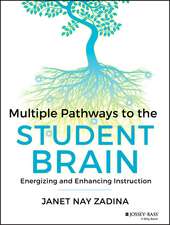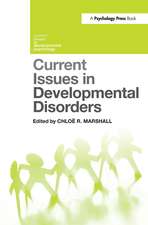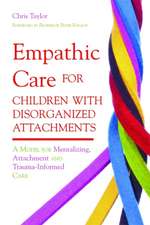Temperament in Clinical Practice
Autor Stella Chess, Alexander Thomasen Limba Engleză Paperback – 4 iul 1995
This book offers a realistic and eminently practical understanding of the role temperament plays in development. The combination of wisdom, common sense, and concrete clinical strategies found in these pages will prove invaluable to psychiatric and health professionals, teachers, and special educators. It also serves as a benchmark text for advanced courses in child psychology and psychiatry.
Preț: 254.86 lei
Preț vechi: 268.26 lei
-5% Nou
Puncte Express: 382
Preț estimativ în valută:
48.77€ • 50.49$ • 41.22£
48.77€ • 50.49$ • 41.22£
Carte tipărită la comandă
Livrare economică 06-20 martie
Preluare comenzi: 021 569.72.76
Specificații
ISBN-13: 9780898628135
ISBN-10: 089862813X
Pagini: 315
Dimensiuni: 152 x 229 x 19 mm
Greutate: 0.54 kg
Ediția:Revised
Editura: Guilford Publications
Colecția Guilford Press
ISBN-10: 089862813X
Pagini: 315
Dimensiuni: 152 x 229 x 19 mm
Greutate: 0.54 kg
Ediția:Revised
Editura: Guilford Publications
Colecția Guilford Press
Public țintă
Postgraduate, Professional, Professional Practice & Development, and UndergraduateCuprins
I. THE FUNCTIONAL SIGNIFICANCE OF TEMPERAMENT
1. The Significance of Temperament
2. Goodness of Fit: Control and Mastery versus the Controlling Parent or Child
3. Parental Reactions to the Child's Temperament
4. Temperament in Infancy
5. Temperament in the Toddler Stage
6. Temperament in Middle Childhood
7. Temperament in Adolescence
8. Temperament in Adult Life
II. CLINICAL APPLICATIONS
9. Obtaining Data on Temperament in Clinical Practice
10. Prevention and Treatment: General Considerations
11. Parent Guidance
12. Direct Treatment of Child and Adult
III. SPECIAL AREAS
13. Temperament and School Functioning
14. Temperament and Pediatric Practice
15. Temperament and Nursing Practice
16. Temperament and the Handicapped Child
IV. OVERVIEW
17. The Clinical Significance of Temperament
Appendix A. Temperamental Categories and Their Definitions
Appendix B. Consistency and Inconsistency of Temperament over Time
References
Index
1. The Significance of Temperament
2. Goodness of Fit: Control and Mastery versus the Controlling Parent or Child
3. Parental Reactions to the Child's Temperament
4. Temperament in Infancy
5. Temperament in the Toddler Stage
6. Temperament in Middle Childhood
7. Temperament in Adolescence
8. Temperament in Adult Life
II. CLINICAL APPLICATIONS
9. Obtaining Data on Temperament in Clinical Practice
10. Prevention and Treatment: General Considerations
11. Parent Guidance
12. Direct Treatment of Child and Adult
III. SPECIAL AREAS
13. Temperament and School Functioning
14. Temperament and Pediatric Practice
15. Temperament and Nursing Practice
16. Temperament and the Handicapped Child
IV. OVERVIEW
17. The Clinical Significance of Temperament
Appendix A. Temperamental Categories and Their Definitions
Appendix B. Consistency and Inconsistency of Temperament over Time
References
Index
Notă biografică
Stella Chess, M.D, who received the Adolf Meyer Award in 1996 from the American Psychiatric Association, is Professor of Child Psychiatry at New York University Medical Center.
Alexander Thomas, M.D., Professor of Psychiatry at New York University Medical Center, served as Director of the Psychiatry Division of Bellevue Hospital from 1968 through 1978.
Well known for the New York Longitudinal Study of the role of temperament in normal and deviant child development, Drs. Chess and Thomas have been honored with numerous awards. Currently, they are consultants to the Temperament Program of the Kaiser Permanente Health Maintenance Organization.
Alexander Thomas, M.D., Professor of Psychiatry at New York University Medical Center, served as Director of the Psychiatry Division of Bellevue Hospital from 1968 through 1978.
Well known for the New York Longitudinal Study of the role of temperament in normal and deviant child development, Drs. Chess and Thomas have been honored with numerous awards. Currently, they are consultants to the Temperament Program of the Kaiser Permanente Health Maintenance Organization.
Recenzii
Chess and Thomas' masterly intuition led to the scientific discovery that innate temperament has a major influence on the child's development and behavior as well as on the parents' attitude. This notion has now impacted the whole field of child psychiatry and psychology and allied disciplines. Clinical practitioners involved with children and families must read this book, eminently practical and humanistic, and especially written for them. --Michel Maziade, M.D., FRCPC, Scientific Director and Professor of Psychiatry, Laval University, Quebec, Canada
The reissue of this seminal book in a paperback format should attract a wide readership among those professionals who work with children and their families. We have the opportunity to amplify the work of Chess and Thomas by extending it into the wider community of health care settings, schools, and parent organizations. Chess and Thomas have given us a remarkable legacy of understanding and knowledge which we in turn can use for the positive growth and well-being of those in our care. --From the Foreword by Marc A. Forman
This book serves as a useful reference for practicing professionals and for students in a variety of educational programs. This book is useful to graduate students as they work to make the transition in understanding temperament from the classroom to the clinic setting. Through the years, Drs. Chess and Thomas have generously given their time to help researchers, clinicians, and students understand and apply their research and clinical findings. The case studies show how uniquely sensitive they are to the needs of both children and their parents--a hard balance for many professionals who work with children and their parents. --Nancy Melvin, Ph.D., R.N., FAAN, Professor & Associate Dean for Graduate Programs & Research, Arizona State University, College of Nursing
All clinicians treating children should understand how temperament 'works.' To that end, Drs. Stella Chase and Alexander Thomas have packed over forty years of clinical wisdom into the pages of Temperament and Clinical Practice. This is essential reading, not just for pediatricians and nurse practitioners, but for teachers, pediatric social workers, health educators, and any other professional dealing with children. A definite must on the Required Reading List for training in these fields. --James R. Cameron, Ph.D., Kaiser Permanente Temperament Program
-The reissue of this seminal book in a paperback format should attract a wide readership among those professionals who work with children and their families. We have the opportunity to amplify the work of Chess and Thomas by extending it into the wider community of health care settings, schools, and parent organizations. Chess and Thomas have given us a remarkable legacy of understanding and knowledge which we in turn can use for the positive growth and well-being of those in our care. --From the Foreword by Marc A. Forman
This book serves as a useful reference for practicing professionals and for students in a variety of educational programs. This book is useful to graduate students as they work to make the transition in understanding temperament from the classroom to the clinic setting. Through the years, Drs. Chess and Thomas have generously given their time to help researchers, clinicians, and students understand and apply their research and clinical findings. The case studies show how uniquely sensitive they are to the needs of both children and their parents--a hard balance for many professionals who work with children and their parents. --Nancy Melvin, Ph.D., R.N., FAAN, Professor & Associate Dean for Graduate Programs & Research, Arizona State University, College of Nursing
All clinicians treating children should understand how temperament 'works.' To that end, Drs. Stella Chase and Alexander Thomas have packed over forty years of clinical wisdom into the pages of Temperament and Clinical Practice. This is essential reading, not just for pediatricians and nurse practitioners, but for teachers, pediatric social workers, health educators, and any other professional dealing with children. A definite must on the Required Reading List for training in these fields. --James R. Cameron, Ph.D., Kaiser Permanente Temperament Program
Descriere
This book is unique in its focus on the clinical use of knowledge about temperament, a subject which no other book addresses exclusively. The book is directed at the clinician in mental health ? the psychiatrist, psychologist, and social worker ? as










